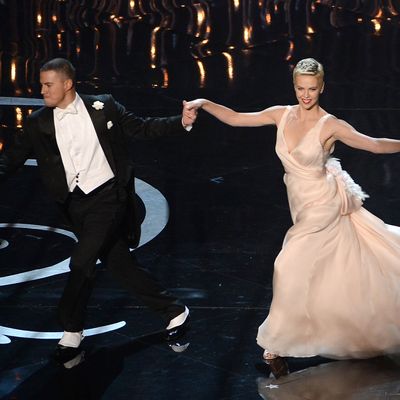
I came away from Oscarcast 2013 with supremely mixed feelings, and not just about the impromptu Shatner landing. (The Trekkie in me applauded; the taxidermist in me felt the workmanship was slipshod.) Can’t be certain, but I believe there was a theme running through the show — other than “women are boob-having harridans” — and that theme was musicals! Are good! This theme was delivered by frat mainstay Seth MacFarlane, an extraordinarily multitalented host who spun extraordinarily tacky material into gold, or at least quality Naugahyde, and fused the reactionary and the classic in ways undreamt of since the Rat Pack. He sang, he danced, he led the Gay Men’s Chorus of Los Angeles, and he made a compelling, subtextual case that his fan base of young masturbators and media pirates should keep a top hat and tails in the closet, alongside their nine interchangeable hoodies and suppressed homosexual tendencies.
MacFarlane’s an old-fashioned triple threat and a good vessel for this message. But what, exactly, was the message about musicals — movie musicals and stage musicals — being sent by this year’s heavily Misérables-scented Oscarcast? Watching sure-footed homunculus Channing Tatum spin fiberglass Charlize Theron is a slam dunk, a quadrant-spanning moment if ever there was one. But the musical high points were all fond looks back at the golden age. It’s not a bad strategy, and it worked, to an extent. “My expectations for award shows are low,” tweeted New York Times critic Jason Zinoman, “but the one thing that the Oscars should (and can) get right is nostalgia.” Yet there was also a nagging sense of necrosis, which many folks picked up on immediately: “Shirley Bassey is my favorite thing at the Oscars,” chirped the Chicago Sun-Times’ Jim Emerson, ” … in 2013. Singing a 49-year-old song that wasn’t nominated.” Comedian Patton Oswalt — who was on fire the whole night — summed it up: “Yeah, it’s Shirley Bassey, then bulk erase everything else, then Adele. Wow.”
Let’s set aside the fact that the musical theme, while comprehensive, was not exactly cohesive: An alien could have come away from the telecast under the impression that James Bond is a movie-musical franchise. (Which, let’s face it: It kind of is.) How many of the songs performed — outside of the Best Song category — were even a little bit new? The most recent selections were a quarter-century old. Catherine Zeta-Jones’s reprise of “All That Jazz” from her 2002 movie version of Chicago — while more than adequately executed — felt like a producer rummaging in the trunk. Ditto Jennifer Hudson, who took the roof off with “And I Am Telling You … ” from Dreamgirls … a 30-year-old show made into a film an awkward seven years ago. Later, in her tribute to a brilliant dead person, Barbra Streisand delivered a heart-tugging “The Way We Were” — but what about the way we are? (Russell Crowe, assisted by a hastily grafted bionic Franken-ear, attempted a bit of clumsy time-travel-into-the-future with his rushed tempos on “One Day More,” alas, to no avail.) The message, to my ears, was that musicals, onstage and onscreen, aren’t dead, just mummified: They’re classy, impressive gimmicks, the Restoration Hardware of pop art. As tropes — and MacFarlane is, above all else, a trope-dealer — they’re vital. But they’re hardly a viable stem-cell line for new work. John Travolta was the sole representative of a newish movie-musical (Hairspray), but we didn’t hear any Shaiman-Wittman tunes — presumably because this would’ve meant getting Travolta into a dress. (And dresses are dangerous!)
My takeaway: It’s a start. Maybe sometime in the distant future — when it’s Wicked’s year, possibly — we’ll incorporate some music composed within the lifetime of the youngest acting nominee. I’d love to hear MacFarlane and the GMC play more than the greatest hits.
Update: A commenter reminds me that Craig Zadan and Neil Meron produced this year’s Oscars. (I wasn’t paying attention at all until MacFarlane started soft-shoeing.) Zadan and Meron produced Chicago (and Hairspray), so that explains why their corpus got privileged. But not why very-much-living composer Marc Shaiman didn’t get a song in edgewise.

